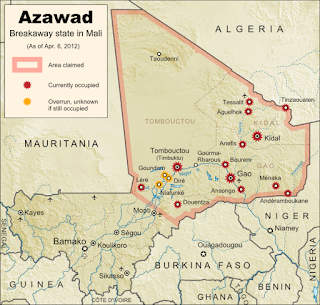France continues foreign aid to rebuild post-conflict Mali

Map showing the fullest extent of rebel-held territory in January 2013, before it was re-taken by Malian and French forces. France has given Mali 300 million Euros in aid since France helped the Malian government re-take control of the country in January 2013, and is now promising another 360 million ($408 million) for 2015-2017. This continuation of support follows the advice of Collier and Hoeffler , who argue that post-conflict aid can be helpful in restoring or initiating economic growth, but find that often foreign governments only send aid for the first few years after a conflict ends, and aid becomes more efficacious as the government rebuilds absorptive capacity in the years after the war ends. So I suspect Collier and Hoeffler will cheer France's persistence. On the other hand, whereas Mali tends to get decent marks on democracy scores (such as Polity ), it tends to get mediocre marks for quality of governance , and several studies have found that aid may only be ...






